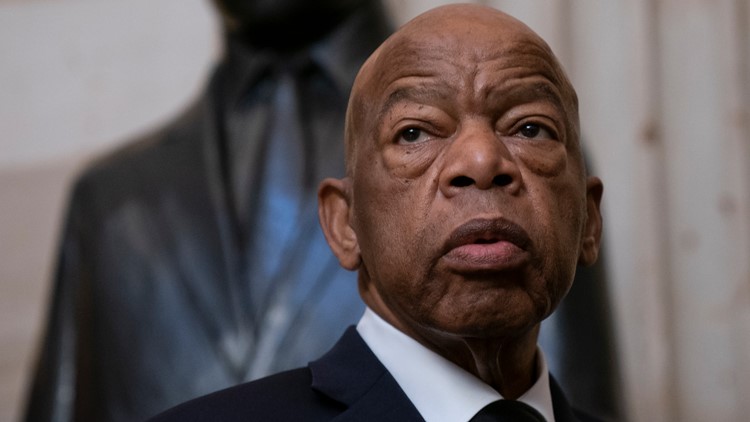AUSTIN, Texas — Texas Governor Greg Abbott has ordered flags to be lowered to half-staff in honor of the life of Rep. John Lewis.
"Pursuant to Sections 3100.065 and 443.024(e) of the Texas Government Code and Title 4 of the U.S. Code (4 U.S.C. § 1 et seq), the flags of the State of Texas and the United States of America shall be lowered statewide to half-staff immediately on Saturday, July 18, 2020, in honor of the life and public service of Congressman John Lewis," the governor said. "Flags should return to full-staff the next day. Individuals, businesses, and other political subdivisions and entities are encouraged to fly their flags at half-staff for the same length of time."
Lewis, an icon of the civil rights movement who helped organize the 1963 March on Washington and became a 17-term United States congressman, died Friday. He was 80.
Lewis died seven months after announcing he was battling advanced pancreatic cancer.
The son of sharecroppers, Lewis was born outside of Troy, Alabama, on February 21, 1940. Inspired by Dr. Martin Luther King Jr., he made a commitment at a young age to become part of the civil rights movement.
A student at the American Baptist Theological Seminary and Fisk University, Lewis protested during nonviolent sit-ins at segregated lunch counters and was often arrested.
He also participated in the Freedom Rides, aimed at desegregating interstate bus terminals, many times choosing to sit where only whites were allowed. He was often beaten by angry mobs and arrested by police.
Lewis helped establish the Student Nonviolent Coordinating Committee and became its chairman in 1963, organizing student activists.
By 23, Lewis was one of what became known as the "Big Six," a group of civil rights leaders who organized the 1963 March on Washington. It was there that Dr. King gave his "I Have A Dream" speech.
Lewis was a keynote speaker at the event.
"To those who have said, 'Be patient and wait,' we have long said that we cannot be patient. We do not want our freedom gradually, but we want to be free now," Lewis said to thunderous applause from the crowd.
The moment that may have defined Lewis' legacy, though, came two years later. On March 7, 1965, Lewis helped lead a march from Selma to Montgomery, Alabama. Some 600 nonviolent protesters marched across the Edmund Pettus Bridge in Selma. They were attacked by Alabama state troopers, and Lewis ended up with a fractured skull. The incident became known as “Bloody Sunday.” The accounts and images of that day are credited with helping pass the 1965 Voting Rights Act.
"On behalf of Texas, the First Lady and I offer our thoughts and prayers to the Lewis family in their time of mourning and remembrance," Gov. Abbott said. "I urge all Texans to appropriately remember John Lewis’ life of service to our nation."



